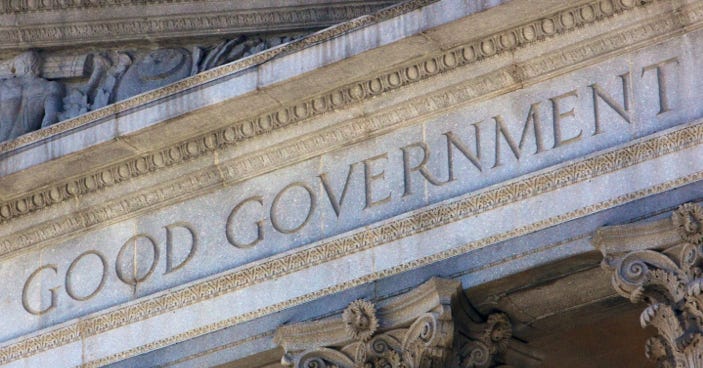We Need All-Around Civic Engagement
The goal is good government. Democracy is a means to that end, but not the end itself.
Yesterday, the Salt Lake Tribune published an article of mine relative to voting and civic engagement. My argument in the article is that we too often focus on just the single act of voting and ignore the broader necessity of overall civic engagement. Please give the full article a read.
The point I’m trying to make is part of my broader observation over the last several decades that many political powers-that-be have been content to create and preserve a political society with high engagement (rallies, volunteer-work, social media engagement, voter-turnout) but shallow knowledge on the actual issues, meager understanding of the government process, and beliefs oriented around popular figures and the narratives they espouse rather than upon consistent principles or ideals.
I have observed a worship of democracy and just democracy, with measurements of the health of a country dwelling purely upon levels of voter turnout. In post-modern politics, it seems, we have forgotten that democratic participation in government is one of several means towards a desired end, and not the end itself.
Medieval scholars held a great disdain for democracy, a disdain they inherited from the ancients who were none too impressed with the results they observed among the Greek city-states. Until the American experiment, democracies had, almost without exception, always devolved into either anarchy or despotism.
In founding the American Republic, the first generation of Americans had to wrestle with and answer those who questioned the feasibility of establishing a representative form of government that could both govern effectively and survive beyond a few generations.
The answer, of course, was the many documents of the founding, including the Declaration of Independence and the U.S. Constitution. The people are ultimately sovereign in the American Republic, but good governance does not derive exclusively from democratic means. As John Adams suggests, we are “a nation of laws, not men.”
We are governed by laws, not the whims of an electorate. The laws themselves must answer to the fundamental law (the Constitution). The people have their say, of course, but in the context of an established system of government meant to temper the anxieties of the people and ensure that the people’s interests are seen to by the best among us (through election and representation).
A passive people cannot possibly maintain such a system of government. We cannot hope to have good government and just laws if the political exercise of a sovereign people fails to extend beyond filling out a ballot.
If elections in America become little more than an exercise of driving opposed, hysterical, and uninformed mobs to the polls and seeing which side gets the most, then the process will be nothing more than a contest of demagogues, a competition to see who can best channel the passions and anxieties of the people towards gaining political power.
We don’t just need more people to vote. We need more informed voters. We need more rational and sound political engagement. We need better candidates. We need more responsible journalists and commentators. Our political conversations need more depth and nuance. Our politics needs to be more respectful and circumspect. Our connection to the world we live in needs to be more real and less the result of contrived views resulting from self-sorted digital spheres on social media and the internet.
In short, we need civics. To finish with a quote from my article at the Salt Lake Tribune:
“Instead of only focusing on a single, narrow political exercise, we should be doing what we can to create and cultivate a culture of complete civic engagement. Not only should we advocate for better and more extensive school instruction on these crucial subjects, they should be dinner table conversations.
We should ask our children basic questions, challenge them to think through political issues, and teach them to articulate their thoughts effectively. We should be challenging ourselves to engage with our friends and neighbors in respectful dialogue about the difficult topics of politics and government.
We must reacquire the broader perspective that, while failing to vote is a failure to exercise an important right, failing to vote as an informed and engaged citizen is a more significant failing of the critical civic duties of responsible citizenship.”




“ We are governed by laws, not the whims of an electorate. The laws themselves must answer to the fundamental law (the Constitution). The people have their say, of course, but in the context of an established system of government meant to temper the anxieties of the people and ensure that the people’s interests are seen to by the best among us (through election and representation). ”
Both parties now have jettisoned this completely. Most people care more about getting power to stick it to their “enemies” than they do about the rule of law or limitations on power.